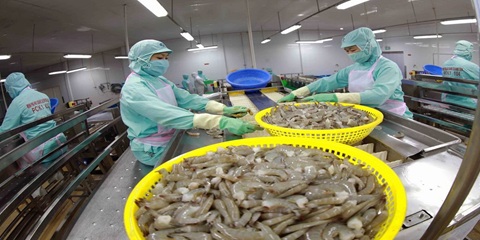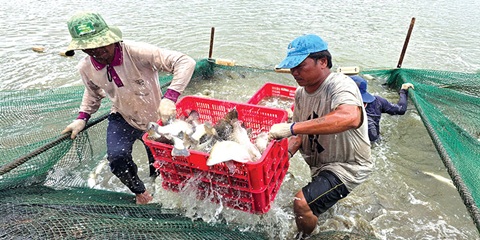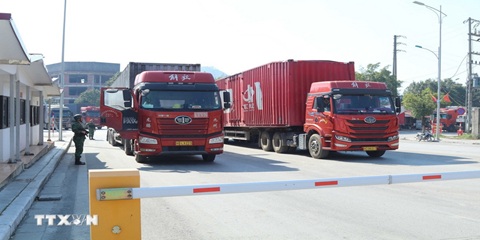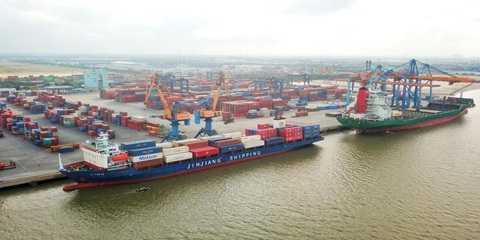Want to be in the loop?
subscribe to
our notification
Business News
KEY SOLUTIONS TO DRIVE GREEN GROWTH
The Prime Minister has issued Directive 44/CT-TTg, dated December 9, 2024, outlining key tasks and solutions to accelerate the implementation of the National Strategy on Green Growth for the 2021-2030 period, with a vision to 2050.
The Directive states that on October 1, 2024, the Prime Minister issued Decision 1658/QD-TTg, approving the National Strategy on Green Growth for the 2021-2030 period, with a vision to 2050 (Green Growth Strategy). To ensure the strategy's effective implementation and achievement of its goals, the Prime Minister has also issued the National Action Plan on Green Growth for 2021-2030, assigning specific tasks and solutions to each ministry, sector, and locality.
In the past time, despite facing multi-dimensional challenges, under the drastic direction and management of the Government and the Prime Minister, and the proactiveness of ministries, sectors and localities, Vietnam's green growth process has achieved many important results, contributing positively to the overall growth of the economy. However, green growth has not really become a driving force for economic growth due to some limitations and challenges in the implementation process. Some goals, tasks, and solutions for green growth have not been adequately integrated into socio-economic development plans and public investment plans, resulting in a lack of synchronization and insufficient resources for implementation across ministries, sectors, and localities. Additionally, the institutional framework and policies for green growth investment remain fragmented, and green financial instruments are still underdeveloped. There is a lack of preferential policies and incentives for breakthrough investment in green growth, leading to a lack of a favorable environment for accessing, mobilizing, attracting and receiving resources for green growth. Implementation capacity is still limited and the awareness of the role and benefits of green growth has not really penetrated the thinking of people and businesses.
Toward the goal of net zero by 2050
To promote the implementation of green growth, towards the goal of net zero emissions by 2050, the Prime Minister requests Ministers, Heads of ministerial-level agencies, Government agencies, Chairpersons of People's Committees of provinces and centrally run cities to focus on directing and implementing assigned tasks in the Green Growth Strategy and Green Growth Action Plan.
In particular, Ministers, Heads of ministerial-level agencies, Government agencies, Chairpersons of People's Committees of provinces and centrally run cities promptly incorporate and integrate green growth goals and tasks into strategies, projects, planning, plans and legal documents that are expected to be issued in the coming time; review and assess the potential of new sectors and fields in green growth. There is a need to accelerate the implementation of programs, projects, and pilot initiatives for new models linked to green growth. Efforts should also focus on promoting communication, education, and raising awareness about the role, significance, and benefits of green growth for both the public and the business community. Furthermore, enhancing coordination and information sharing among ministries, sectors, and localities is essential to improve the effectiveness of green growth implementation.
Realizing green growth in line with socio-economic development
The Ministry of Planning and Investment shall develop a mechanism to monitor, evaluate and report on the implementation of the Green Growth Strategy; develop a roadmap to realize green growth associated with socio-economic development with a long-term vision towards the goal of carbon neutrality.
It is necessary to institutionalize and supervise the adjustment and supplementation of new economic policies, models and tools to promote economic restructuring associated with innovation of the growth model towards greenness and sustainability, ensuring equality and competitiveness, and promoting the important role of the private sector in the green transformation process.
There is also a need to strengthen advocacy and mobilize resources for green growth, amend legal documents to prioritize state budget capital for green initiatives, develop investment incentives, and support green pilot projects. Additionally, a comprehensive list of green pilot projects and key tasks for each period should be compiled.
Developing incentive policies to encourage investment in green projects
The Ministry of Finance is tasked with reviewing, amending and supplementing policies on state budget expenditures to promote green growth, developing financial incentives to encourage investment in green projects, and urgently completing the project to establish and develop a carbon market in Vietnam.
The State Bank shall review, adjust and perfect banking and credit institutions in line with green growth goals, especially green credit and green banking; develop solutions to concentrate resources for green credit, preferential credit policies for green projects; direct credit institutions to promote green credit, focus capital on green economic sectors, green projects, and environmentally friendly projects.
The Ministry of Industry and Trade is tasked with restructuring and upgrading industries through innovation and the application of science and technology, boosting investment in green industries such as renewable energy, hydrogen, electric vehicles, and charging infrastructure. It will also complete and implement the plan for transitioning from coal power to clean energy, commit to global renewable energy and energy efficiency targets, and promote research and solutions to adapt to the Carbon Border Adjustment Mechanism (CBAM).
The Ministry of Natural Resources and Environment shall strengthen resource management, environmental protection, nature conservation and biodiversity, adaptation to climate change, improve capacity for monitoring, forecasting and warning of natural disasters; prioritize resource allocation, accelerate implementation of key projects on climate change response, natural disaster prevention, especially drought, saltwater intrusion, subsidence, riverbank and coastal erosion, landslides, etc.
The Ministry of Natural Resources and Environment is tasked with refining mechanisms and policies for carbon credit exchange and offset, establishing environmental criteria and certifying projects for green credit, and issuing green bonds. It will also finalize the national green criteria set to classify economic activities and complete regulations, policies, and technical standards to accelerate the implementation of a circular economy.
The Ministry of Construction is tasked with developing and refining institutions, policies and tools for monitoring and evaluating the development of green, smart, and climate-resilient urban areas, green construction, public infrastructure, and environmentally friendly transportation. It will also focus on producing and using low-carbon construction materials and adopting new and clean energy sources. The ministry is responsible for completing the National Technical Regulations on infrastructure works, emphasizing climate change response and emission reduction in areas such as water supply, drainage, solid waste treatment, lighting, and energy supply.
Encouraging the development of green, organic, circular, high-tech agriculture
The Ministry of Agriculture and Rural Development is tasked with promoting the restructuring of the agricultural sector, encouraging the development of green, organic, circular, high-tech agriculture, environmental protection, emission reduction and climate change adaptation; perfecting agricultural and rural infrastructure to adapt to climate change, focusing on irrigation and clean water works to serve the restructuring of the agricultural sector and the construction of new rural areas; focusing on effectively implementing the project "Sustainable development of one million hectares of high-quality and low-emission rice cultivation associated with green transformation in the Mekong Delta by 2030".
The Ministry of Foreign Affairs shall advise on establishing cooperation frameworks on green economy, promoting "economic diplomacy", "technology diplomacy", "climate diplomacy", technological cooperation, mobilizing financial resources for green transformation, green transformation; proactively participates and makes positive contributions to international cooperation frameworks and initiatives on green growth and sustainable development to enhance Vietnam's international role and image, facilitate the mobilization of international resources, and creates conditions for Vietnamese enterprises to participate in global green supply chains.
Driving digital transformation to support green growth
The Ministry of Information and Communications is to promote information, propaganda and mobilization of people, businesses, manufacturers, organizations and individuals in the whole society to change awareness, production, consumption and green lifestyles; promote digital transformation to serve green growth; integrate green growth into synchronous infrastructure investment programs and plans in digital transformation.
The Ministry of Education and Training is to integrate green growth into education and training at all levels, promotes and educates on soft skills, and forms a green and civilized lifestyle and awareness; promote training of high-quality human resources to serve sectors and fields related to green growth (new energy sector: hydrogen).
Promoting green tourism service development
The Ministry of Culture, Sports and Tourism is to complete the legal framework and policy mechanism for green tourism development; handle violations of environmental and landscape encroachments, raises awareness of tourism environmental protection; develop and effectively implements the Tourism System Planning for the period 2021-2030, with a vision to 2045; develop a set of synchronous and effective green tourism development standards; develop green tourism products and services, promote the values of natural resources and national cultural heritage and promotes green tourism.
The Ministry of Labor, War Invalids and Social Affairs shall complete integrated policies to respond to climate change, promote green job creation, support job transition, create new jobs and ensures social security; issue policies to develop sustainable livelihoods for workers, especially vulnerable workers; effectively implement programs and projects to support labor market development and job creation in areas related to green growth; integrate new training sectors and occupations in green growth fields to vocational training and education programs; increase investment in facilities and training equipment for vocational education institutions toward a green vocational training environment, meeting national and international green standards and criteria.
The Ministry of Science and Technology shall complete a national list of clean technologies, advanced technologies, high technologies, low carbon emissions in manufacturing industries; prioritize the allocation of science and technology tasks for green growth. In addition, it will deploy research, development and application of new energy sources, especially technology for production, storage, distribution and use of hydrogen; carbon capture/utilization (CCS/CCUS); do research, testing, improvement, innovation of clean technologies in universities, research institutes, large private enterprises towards the transition to a low-carbon economy, reducing energy consumption and reducing greenhouse gas emissions.
Refining policy mechanisms to promote green transport
The Ministry of Transport is tasked with refining policy mechanisms to encourage the use of green transport and green energy, including hydrogen fuel for vehicles, equipment and transport infrastructure. The business community, industry associations, research institutes and universities are also encouraged to collaborate with ministries and sectors, mobilizing contributions from domestic and international organizations and development partners to implement the National Strategy on Green Growth. Additionally, efforts will be made to strengthen awareness campaigns and promote green growth.
Source: VCCI
Related News

VIETNAM’S SEAFOOD EXPORTS HIT OVER US$10 BILLION IN JAN-NOV
Seafood export revenue in November alone amounted to nearly US$990 million, up 6.6% year-on-year. Key product groups posted solid gains. Shrimp exports rose 11.7% to over US$385 million, supported by strong demand for whiteleg shrimp and lobster. Tra fish shipments increased 9.7% to almost US$197 million, while marine fish, squid, and mollusk exports maintained their recovery.

VIETNAM’S AGRO-FORESTRY-FISHERY EXPORTS HIT NEW RECORD IN JAN-NOV
Vietnam’s agro-forestry-fishery export revenue reached an estimated US$64.01 billion in the first 11 months of 2025, up 12.6% year-on-year and surpassing the full-year record of US$62.4 billion set in 2024. Agricultural exports reached US$34.24 billion, up 15% year-on-year, while livestock products brought in US$567.4 million, a 16.8% increase. Seafood exports rose 13.2% to US$10.38 billion, and forestry products earned US$16.61 billion, up 5.9%.

HANOI REPORTS RECORD-HIGH BUDGET REVENUE IN 2025
Hanoi’s budget revenue is estimated to reach VND641.7 trillion in 2025, the highest level ever recorded and nearly 25% above the revised target, according to a report by the municipal government. Data from the city’s socioeconomic performance review shows that total state budget collections in 2025 are projected to reach 124.9% of the adjusted plan and rise 24.9% from 2024, the Vietnam News Agency reported.

VIETNAM, CHINA TO PILOT TWO-WAY CARGO TRANSPORT AT LANG SON BORDER
Vietnam and China will launch a one-year pilot program on December 10 to allow two-way cargo transport through the Huu Nghi–Youyi Guan international border gates in Lang Son Province, reported the Vietnam News Agency. The Dong Dang-Lang Son Economic Zone Management Board said the trial aims to reduce transport costs and improve customs clearance capacity.

VIETNAM’S IMPORT-EXPORT VALUE NEARS US$840 BILLION IN JAN-NOV
The total value of Vietnam’s imports and exports was nearly US$840 billion between January and November this year, the highest level ever recorded, according to the National Statistics Office. In its latest report on the country’s socio-economic performance, the National Statistics Office highlighted a series of positive economic indicators, with trade emerging as one of the strongest drivers of growth.

OVER 19 MILLION INTERNATIONAL VISITORS COME TO VIETNAM IN JAN-NOV
Vietnam received more than 19.1 million international visitors in the first 11 months of 2025, a 20.9% increase year-on-year and the highest level ever recorded, according to the National Statistics Office. The figure surpasses the full-year record of 18 million arrivals set in 2019, before the Covid-19 pandemic. Nearly two million foreign visitors arrived in November alone, up 14.2% from October and 15.6% from the same period last year.
























